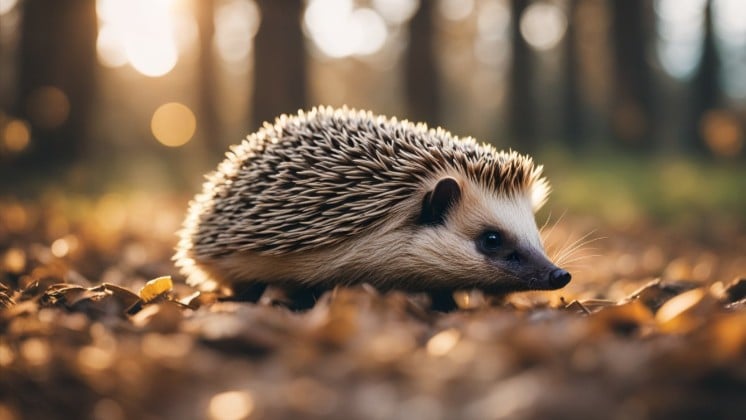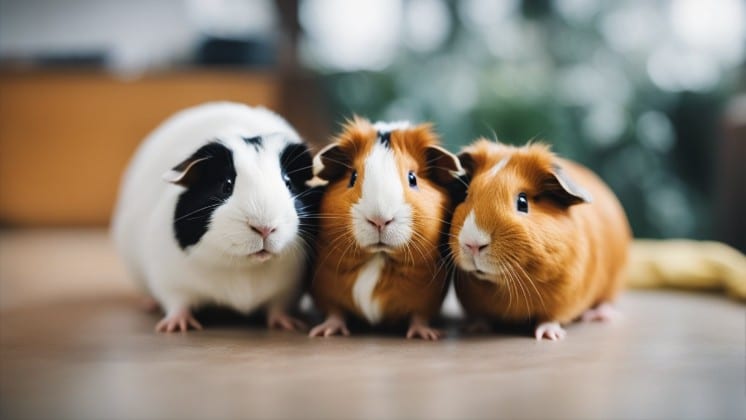If you are an exotic pet lover, you’ve probably thinking to add one of these two animals to your home. So you’ve probably wondered: do hedgehogs and chinchillas get along?
They can get along quite well. In the wild, hedgehogs and chinchillas would typically eat different things, so they wouldn’t compete for food. Hedgehogs like to eat insects, while chinchillas prefer a diet of grasses, leaves, and twigs.
Generally, hedgehogs are quiet animals, I find them very often roaming around my garden. Chinchillas, on the other hand, are very active and vocal animals.
In this article, we will explore the relationship between hedgehogs and chinchillas, and see if they can be friends, so that you can make an informed decision about whether or not to get both of these animals.
Let’s get started.
Which is a better pet a hedgehog or a chinchilla?
There isn’t necessarily a “better” pet between hedgehogs and chinchillas, it really depends on what you’re looking for in a pet and what your lifestyle is like. If you’re looking for a cuddly, social pet that will enjoy snuggling with you, then a chinchilla might be a better choice.
However, if you’re looking for an independent pet that is still fairly low-maintenance, then a hedgehog may be a better option.
So, do hedgehogs and chinchillas get along?
If you are planning to get these two pets together, there are a few things you should keep in mind.
First of all, you will need to have two separate cages for them since they are two different species.
Secondly, you will need to make sure that the cage for the hedgehog is escape-proof since they are known to be very good climbers.
And lastly, you should introduce them to each other slowly and carefully to make sure that they are comfortable with each other before letting them play together.
Differences between hedgehogs and chinchillas
Hedgehogs are small, spiny mammals native to Europe, Asia, and Africa, while chinchillas are native to the Andes mountains in South America.
Hedgehogs are nocturnal, meaning they are most active at night, while chinchillas are crepuscular, meaning they are most active at dawn and dusk.
Hedgehogs are omnivores, eating both plants and animals, while chinchillas are herbivores, eating only plants.
That said, both hedgehogs and chinchillas make great pets, however, despite their many similarities, there are also some important differences to keep in mind when deciding which is right for you.
Pet ownership is a big responsibility, and there are many factors to consider before bringing a new animal into the home.
One important consideration is whether to choose a hedgehog or chinchilla as a pet. Both animals have unique personalities, characteristics, and needs that must be taken into account.
Hedgehogs Behavior
Hedgehogs are nocturnal animals, meaning they sleep during the day and are awake at night.
Their sense of hearing is so acute that they can even detect approaching predators. When a hedgehog senses danger, it rolls into a tight ball. In fact, even if you pick up a hedgehog, it will often roll into a ball as a defense mechanism.
This protects its softer underbelly and face from the attack. The sharp spines on its back also deter predators. If all else fails and the hedgehog is captured by a predator, it will sometimes feign death in hopes of being released.
That is why, if you do decide to get a hedgehog as a pet, it is important to create a safe environment for it to live in.
Hedgehogs are also very curious animals and love to explore their surroundings. This can often lead them into trouble, so it’s important to hedge-proof your home before bringing one into the family.
Size
On average a hedgehog will grow to be about 4 to 12 inches long and weigh between 1 and 2 lbs.
These are measure that needs to be taken into consideration when building or buying a hedgehog since they will need a home that is big enough for them to move around, but not so big that they feel lost or overwhelmed.
The Exotic Nutrition hedgehog cage available on Amazon is a good option for those looking for a quality cage that meets the size requirements for these small animals.
It is important to remember that hedgehogs are escape artists, so the cage should be escape-proof.
(source)
Lifespan
Hedgehogs have a lifespan of between two and five years, although some have been rare cases of them living up to eight years.
This is something else to keep in mind when deciding whether or not a hedgehog is the right pet to add to your family. Because they don’t live as long as some other animals, hedgehogs may not be the best choice for those looking for a lifelong companion.
Fur
Hedgehogs have short, stiff spines sticking out of their back and sides that are used for protection. In fact, they use it to protect themselves so well that sometimes their spines get stuck in things like blankets or clothes.
That being said, they do shed their spines, so it’s important to provide them with a place to do this where it won’t be a problem.
Eyesight
Hedgehogs are nocturnal creatures, so they rely heavily on their sense of smell and hearing. However, they also have excellent eyesight.
Unlike many other nocturnal animals, hedgehogs have acute color vision, meaning they can see in low light conditions just as well as they can during the day. This adaptation helps them to find food and avoid predators.
Care
Domestic hedgehogs are becoming increasingly popular as pets, making them more available than ever before.
However, before bringing one home, it’s important to consult with a veterinarian and make sure you are prepared to provide the proper care for your new pet.
Hedgehogs are unique creatures that require specific care and attention in order to thrive.
Hedgehog’s diet and nutrition
Hedgehogs are insectivores. Meaning they eat a variety of insects, including beetles, caterpillars, crickets, earwigs, grasshoppers, millipedes, moths, slugs, and worms.
They can also eat snails. In the wild, they eat about Hedgehogs and consume about 25% of their diet as insects.
Hedgehogs need a diet that is high in fat and protein and low in carbohydrates. A diet that is too high in carbohydrates can lead to obesity and other health problems.
The best diet for a hedgehog is a mix of insects, meat, and vegetables. Commercial hedgehog food is available, but it is not as good as a diet that contains live insects.
Chinchillas Behavior
Chinchillas are very social animals, and they typically live in colonies of up to 100 individuals.
They are also very active, and they spend much of their time climbing and running.
Chinchillas are also known for their playful nature, and they often engage in activities such as chasing and wrestling with one another. However, chinchillas can also be aggressive, and they have been known to bite when they feel threatened.
Size
Chinchillas come in a variety of sizes, on average they have 9 to 14 inches body length, and they weigh between 1.1 to 1.8 lbs.
Of course, the weight will also depend on the sex of the chinchilla since males are typically larger than females, and how much you’re going to feed them.
Lifespan
Chinchillas typically live between 8 to 10 years in captivity, although some individuals have been known to reach 25 years or more. In the wild, however, their lifespan is thought to be much shorter due to predation and the harshness of their environment.
Chinchillas fur
Chinchillas are native to the Andes mountains in South America, due to the harsh weather conditions, over the centuries of evolution they have developed a thick fur coat in order to protect them from the cold.
In fact, their fur is very dense, and their top coat is quite long. The downside to this is that their fur can also be very dry, and if it isn’t taken care of properly, it can become quite matted.
In a recent article, I go over in more detail why your chinchilla fur gets matted and what you can do to prevent it.
Click the link to learn more on my site.
Chinchillas eyesight
Chinchillas are mostly crepuscular (most active at dawn and dusk) so they don’t need great eyesight during the day. This is due to the fact that they are prey animals in the wild. They have developed a great hearing and sense of smell though, which helps them to avoid predators.
To learn more if chinchillas can actually see in the dark, check out my recent article where I explained everything about chinchilla eyesight, and more importantly what this means for you as a chinchillas owner.
Click the link to read the article.
Care
Generally, chinchillas are clean, quiet, and relatively easy to care for. Chinchillas need a spacious cage with plenty of room to run and climb. they also like to burrow and nest, so a layer of wood shavings or hay is necessary.
Chinchillas are very active and playful, so it is important to provide them with toys and plenty of space to run around.
Due to their social nature, chinchillas, do best when kept in pairs or small groups. They are also very intelligent and can be trained to do simple tricks. Overall, chinchillas make great pets for those who are willing to provide them with the care they need.
Chinchilla’s diet and nutrition
Domestic chinchillas require special care, including a diet of high-quality hay, pellets, and fresh vegetables.
Chinchillas are generally healthy animals, but they can be prone to certain health problems if their diet is not properly balanced.
For example, eating too many fatty foods can lead to diarrhea, while consuming too much sugar can cause dental problems.
As a result, it is important to consult with a veterinarian before feeding your chinchilla anything other than hay and pellets.
(source)
Should you keep a hedgehog as a pet?
There are a lot of factors to consider when deciding if a hedgehog is a right pet for you. Hedgehogs require a lot of attention and care, and they may not be the best fit for everyone.
Some things you’ll want to consider before getting a hedgehog include:
- Whether or not you have enough time to devote to caring for your hedgehog,
- Whether you have any other pets that could potentially conflict with a hedgehog,
- If you live in an area where it’s legal to own hedgehogs, and if you’re comfortable handling a spiky animal.
That being said, hedgehogs can make excellent pets for the right person. They are relatively low-maintenance, and they are generally very docile animals.
Do hedgehogs and chinchillas get along?
Unfortunately, there are not enough information and research on this topic, so we can’t give you a straight answer.
From our experience, and from what we’ve heard from other chinchilla owners, it seems that hedgehogs and chinchillas don’t really get along.
Hedgehogs are known to be very curious creatures, and they like to explore their surroundings. This can often lead to them getting into things that they’re not supposed to, which can be very dangerous for a chinchilla.
Generally speaking, though, hedgehogs and chinchillas can get along well if they are introduced to each other gradually and under close supervision.
If you do decide to introduce a hedgehog and a chinchilla, remember to always supervise their interactions and keep a close eye on them. If either animal appears uncomfortable or is being bullied by the other, separate them immediately.
Which is the right pet for you?
Hedgehogs are small, spiny mammals that make great pets. They are low maintenance and do not require a lot of space. Chinchillas are also low-maintenance pets that do not require a lot of space. They are both good choices for people who live in small apartments or homes.
Final thoughts
In conclusion, while hedgehogs and chinchillas can get along, it is not always the best idea.
In this article, we’ve looked at whether or not hedgehogs and chinchillas get along. We’ve also looked at some of the things you need to consider if you’re thinking about getting both animals.
And, we have some final thoughts on which pet is right for you. Either way, if you’re curious to learn more about chinchillas, check out my other articles.





